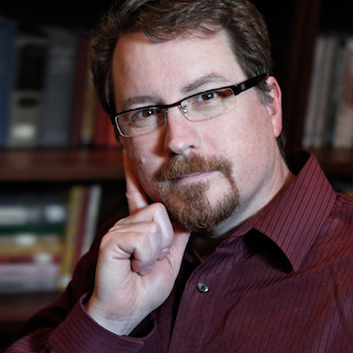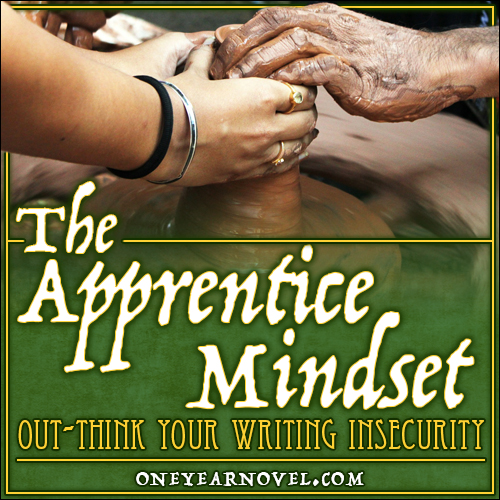The Apprentice Mindset: Out-Think Your Writing Insecurity
It’s painfully familiar, isn’t it?
You’re four chapters into a novel—a project that recently excited you with its promise of fascinating characters and unexpected plot twists—when you realize your book isn’t going to work. Oh, it could work. If Brandon Sanderson were writing it. Or Stephen King. Or Maggie Stiefvater.
But this book idea got stuck with you. Miserable, fumbling, pathetic, unwriterly you. Someone in the mailroom at Muse Central stuffed inspiration into the wrong box.
Really, why are you still pretending to be a writer? Why don’t you give it up and admit defeat? Your prose is uglier than an airport terminal and less compelling than a dentist’s chair. Your most nuanced characters would fit, with room to spare, in a pizza box. Your plots are as rehashed as a hamburger casserole. Your Beta readers not only don’t respond with feedback, they change their email addresses and move to Venezuela.
Need I go on?
Insecurity is part of every writer’s apprenticeship. It’s the price we pay for loving words and stories so much. We can’t help comparing our work to that of writers we admire. We want to create stories as moving and life-changing as the ones that moved and changed us.
So we set our course by the brightest stars. And it’s not just the best writers we try to emulate. It’s the best works of the best writers. No playwright strives to produce something as good as, say, Titus Andronicus. Instead, we strive for Hamlet or King Lear. We don’t aspire to the “greatness” of Across the River and Into the Trees; we demand of ourselves The Old Man and the Sea or A Farewell to Arms.
Which proves that we have artistic taste. But also that we are a little mad. No one but Hemingway could have produced The Old Man and the Sea. More importantly, no one but Hemingway at the height of his literary powers could have produced it.
Here’s the truth: it is destructive to evaluate yourself as a writer by such impossible standards. If you listen to the voices that tell you how mediocre your words are, you may give up before you have spent enough time as an apprentice to develop your own unique voice and style. You will be tempted to quit when the only real problem with your journey towards artistic mastery is that you haven’t been working at it long enough.
Here then are three things to remember when insecurity sends its nasty little text messages into your mind:
- It is normal to feel insecure about your own writing. You dislike it because you saw it born, saw its ugliness and misshapen form. You loved it for its potential, but that potential was never fully realized. The fact you are aware of the ways in which your work fails is proof that you have the artistic talent to be better.
- Realize that others don’t see your story this way. Most readers can appreciate a variety of well-crafted sentences. They enjoy different styles, different voices. Which means that they will probably like your work better than you do. They may notice its flaws, but they approach it with different expectations, which means they are more likely to enjoy it for what it is.
- It may be tempting to seek validation from awards, financial profit, the flattery of peers, or by prematurely self-publishing a manuscript that isn’t ready. None of these things will cure the feeling of being an imposter.
What might help is teaching yourself to love the discipline of writing regardless of the end result. Any apprenticeship requires time, effort and persistence to achieve mastery. But writing is an especially difficult skill to master. Therefore, learn to love the practice, not just the performance.
When doubt and insecurity whisper in your ear, remind yourself that you aren’t writing to be important, or to be honored, or to show everyone you can do it. You are creating because that’s what creators do. You are writing to entertain, to inspire, to enlighten. Whether you do these things well or poorly is not the most important factor. Not yet. First you must simply practice.
God didn’t just make eagles and whales and leopards. He also made robins and goldfish and moles. And he called all of them good.
…
How do you combat your writing insecurities?
…
 Daniel Schwabauer, MA, is the creator of The One Year Adventure Novel, Byline, and Cover Story Writing curricula. His professional work includes stage plays, radio scripts, short stories, newspaper columns, comic books and scripting for the PBS animated series Auto-B-Good. His young adult novels, Runt the Brave and Runt the Hunted, have received numerous awards, including the 2005 Ben Franklin Award for Best New Voice in Children’s Literature and the 2008 Eric Hoffer Award. His third book, The Curse of the Seer, released in the summer of 2015.
Daniel Schwabauer, MA, is the creator of The One Year Adventure Novel, Byline, and Cover Story Writing curricula. His professional work includes stage plays, radio scripts, short stories, newspaper columns, comic books and scripting for the PBS animated series Auto-B-Good. His young adult novels, Runt the Brave and Runt the Hunted, have received numerous awards, including the 2005 Ben Franklin Award for Best New Voice in Children’s Literature and the 2008 Eric Hoffer Award. His third book, The Curse of the Seer, released in the summer of 2015.



